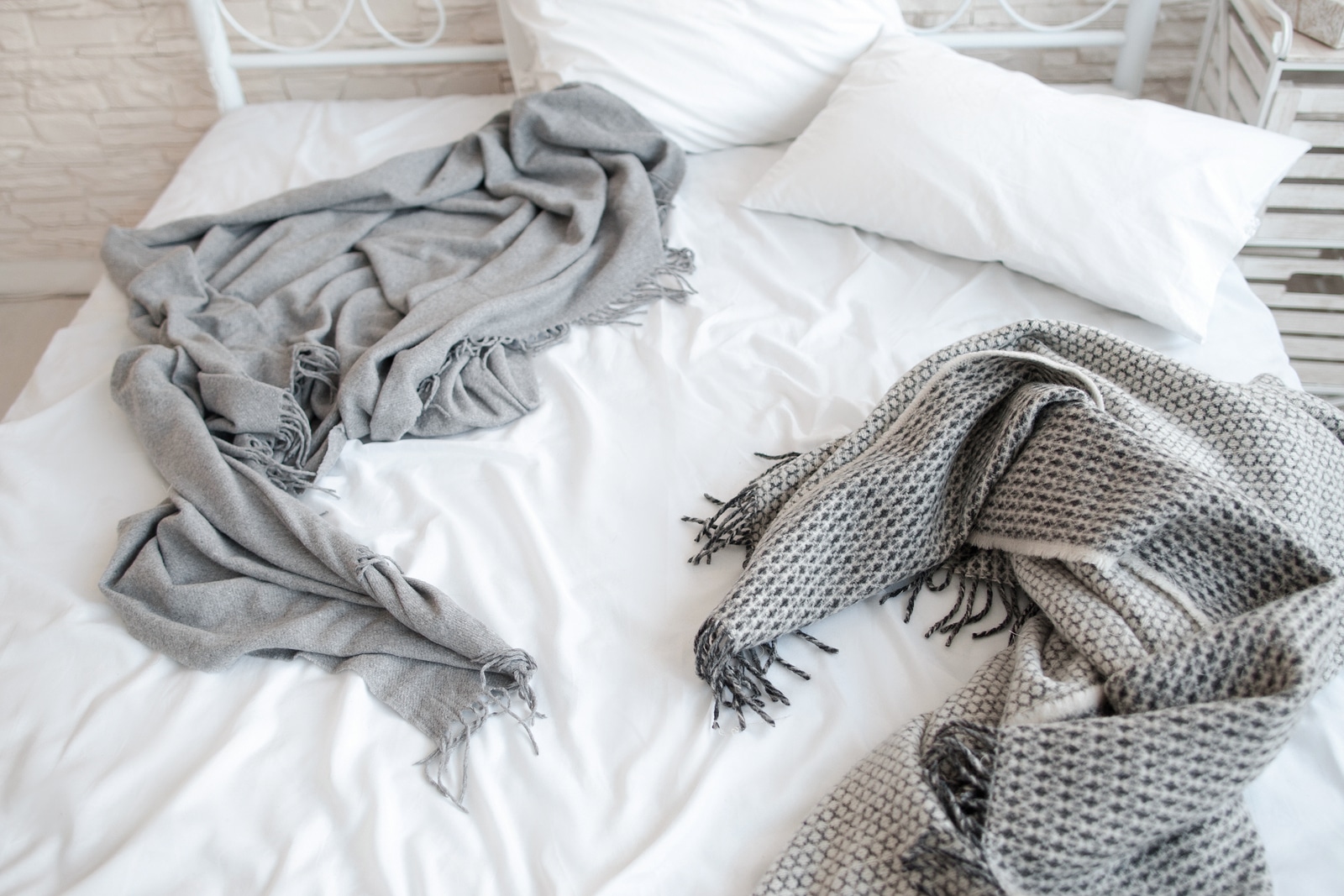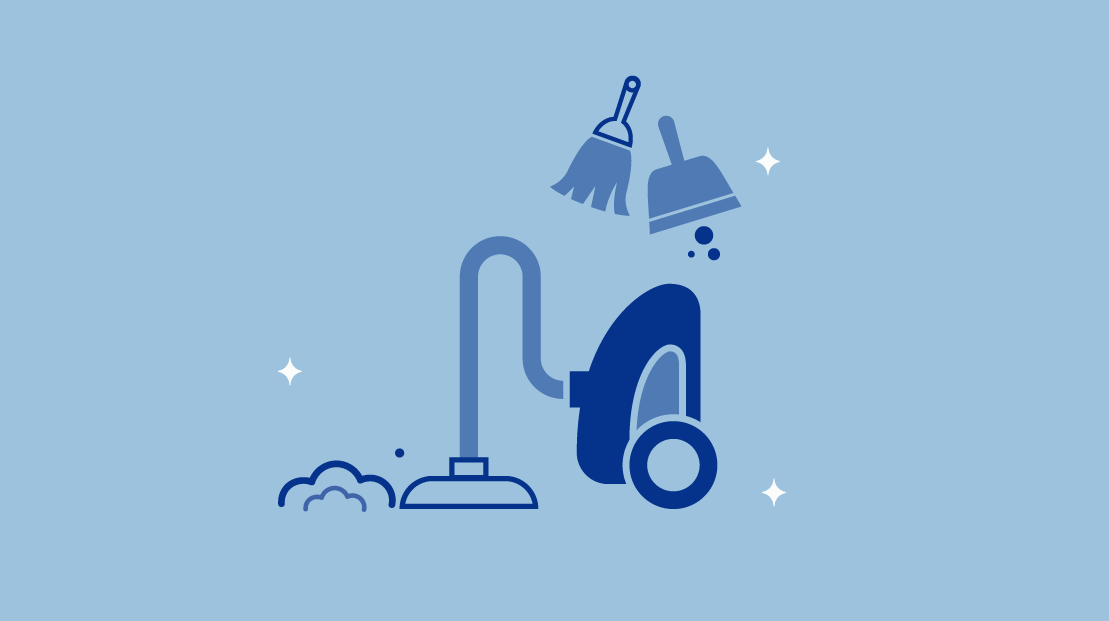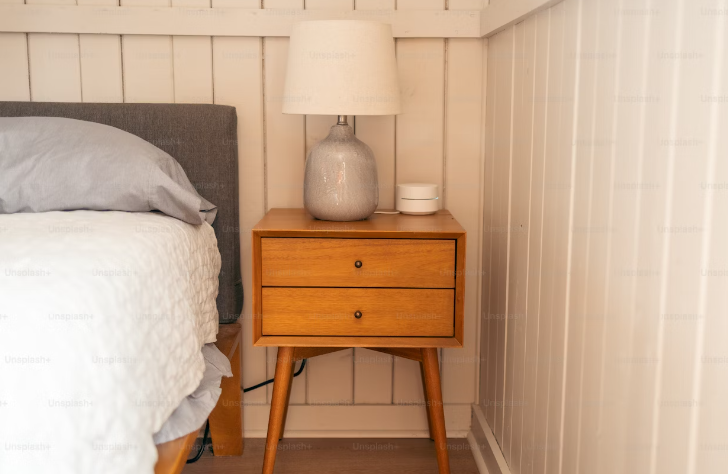Arianna Huffington, founder and editor-in-chief of the Huffington Post and accomplished author, recently released a new book on a topic we’re quite fond of here: getting sleep.
In The Sleep Revolution, Arianna provides insight into the crisis of sleep deprivation and its expansive effects on all aspects of life. Incorporating the history of sleep with modern culture and science, her latest work makes the case for change, and explains how to harness the power of sleep in daily life.
The Huffington Post mogul has become a significant influence in the world of wellness in recent years, even launching an entire column dedicated to sleep topics. In a previous interview, we discussed the future of the mattress industry, and this time we asked Arianna to come share her wisdom with readers of the Amerisleep Early Bird blog.
Read on to see why she believes sleep is important for everyone, and how revolutionizing contemporary cultural attitudes can improve wellness and even business in big ways.
Firas: Your latest book, The Sleep Revolution, is getting incredible reviews all over. Can you tell us about what inspired you to attempt revolutionizing rest, and what that means?
Arianna: It started with my own painful wakeup call. On the morning of April 6, 2007, I was lying on the floor of my home office in a pool of blood. On my way down, my head had hit the corner of my desk, cutting my eye and breaking my cheekbone. I had collapsed from exhaustion and lack of sleep. In the wake of my collapse, I found myself going from doctor to doctor, from brain MRI to CAT scan to echocardiogram, to find out if there was any underlying medical problem beyond exhaustion. There wasn’t, but doctors’ waiting rooms, it turns out, were good places for me to ask myself a lot of questions about the kind of life I was living.
I wrote about my wakeup call in my last book, Thrive, and as I went around the world talking about the book I found that the subject people wanted to discuss most—by far—was sleep: how difficult it is to get enough, how there are simply not enough hours in the day, how tough it is to wind down, how hard it is to fall asleep and stay asleep, even when we set aside enough time.
“It’s clear that if we’re going to truly thrive, we must begin with sleep.”
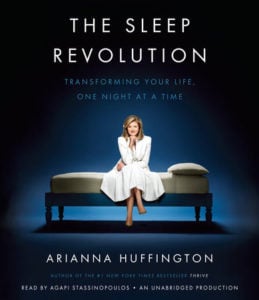
Firas: Sleep is certainly getting much more attention than it used to, thanks in part to voices like the Huffington Post. What do you think is one of the main catalysts making people more receptive to learning about sleep and wellness in 2016?
Arianna: The science. In the last four decades, science has validated much of the ancient wisdom about the importance of sleep. We’ve made incredible discoveries about all the things going on in our brains and our bodies while we’re sleeping, and these findings have fueled a sleep renaissance, in which the power of sleep to profoundly affect virtually every aspect of our lives is beginning to be recognized.
“The power of sleep to profoundly affect virtually every aspect of our lives is beginning to be recognized.”
Firas: In your research on sleep for your newest book, what’s one of the most surprising things you discovered?
Arianna: A lot of people in our culture— especially hard-charging men— like to think they don’t need much sleep and even brag about it. It usually goes something like this: “Sure, other people need a full night’s sleep in order to function and be healthy and alert. But I’m different.” One of the most surprising things I discovered, however, is that less than 1 percent of the population actually qualifies as “short sleepers”—those rare few able to get by on little sleep without experiencing negative consequences. Though many people would like to believe they can train themselves to gain admission to the short-sleeping 1 percent, the trait is actually the result of a genetic mutation. You either have it or you don’t.
Firas: What other lifestyle changes have helped you reduce stress, stay healthy and maintain productivity without burning out?
Arianna: Sleep-wise, developing a bedtime ritual has been one of the most beneficial changes I’ve made. I treat my transition to sleep as a sacrosanct ritual. Before bed, I take a hot bath with epsom salts and a candle flickering nearby—a bath that I prolong if I’m feeling anxious or worried about something. I don’t sleep in my workout clothes as I used to (think of the mixed message that sends to our brains) but have pajamas, nightdresses, even T-shirts dedicated to sleep. Sometimes I have a cup of chamomile or lavender tea if I want something warm and comforting before going to bed. And I have a specific time at night when I regularly turn off my devices — and gently escort them out of my bedroom.
“A big part of my morning ritual is about what I don’t do: when I wake up, I don’t start the day by looking at my smartphone.”
The way I start my day is also, of course, hugely important in determining what follows. And a big part of my morning ritual is about what I don’t do: when I wake up, I don’t start the day by looking at my smartphone. Instead, once I’m awake, I take a minute to breathe deeply, be grateful, and set my intention for the day. Then I do 30 minutes on my stationary bike, on days when I’m home.
Firas: Being a CEO, I see daily how tough it can be to balance productivity and wellness in the workplace. What’s your best advice for business owners and managers on how to encourage teams to be healthier, and for their own health?
Arianna: Today, so many of us fall into the trap of sacrificing sleep in the name of productivity. But, ironically, our loss of sleep, despite the extra hours we put in at work, collectively adds up to more than eleven days of lost productivity per year per worker, or about $2,280. This results in a total annual cost of sleep deprivation to the US economy of more than $63 billion, in the form of absenteeism and presenteeism (when employees are present at work physically but not really mentally focused).
So my advice to business owners and managers is to lead the way to redefining what we value, and changing workplace culture so that working till all hours and walking around exhausted become stigmatized instead of lauded.
“My advice to business owners and managers is to lead the way to redefining what we value.”
Firas: We’ve heard that Huffington Post offices include nap rooms, which is something we also integrate into the Amerisleep offices. How do you find this has influenced your team and the workplace?
Arianna: At HuffPost, there was skepticism when we first installed nap rooms in New York in 2011. HuffPosters were reluctant to be seen walking into a nap room in the middle of a bustling newsroom in “the city that never sleeps.” But now they are perpetually full, and we’re spreading nap rooms around the world, starting with our London office. And more and more companies are installing nap rooms, including Ben & Jerry’s, Zappos, and Nike.
![Huffington Post nap room [Photo: The Webby Awards]](https://amerisleep.com/blog/wp-content/uploads/2016/04/nappod.jpg)
Firas: Do you think the greatest impacts for society will come from individual efforts, or does sleep need to be tackled in earnest by businesses and thought leaders to see a significant cultural change?
Arianna: Both are extremely important, and the good news is there’s a tremendous amount of momentum behind both individual and institutional efforts. And often one leads to another. We have a growing number of leaders in every field realizing that well-rested employees are better employees. In sports, in schools, in medicine, and in the workplace, sleep is finally beginning to claw its way back to the place of respect and reverence it deserves. But that has to start with changing how we think about sleep – and no longer incentivizing sleep deprivation by equating it with dedication and success. In fact, if you look at ancient history, you’ll find that our ancestors slept about three hours after the sunset and woke up right before sunrise. The Mesopotamians also invented pillows to get restful sleep and insomnia wasn’t really a thing. This change alone will transform our culture.
“Sleep is finally beginning to claw its way back to the place of respect and reverence it deserves.”
Firas: Millennials and younger people often place a low priority on sleep, or don’t feel like a lack of rest is something that will impact them until middle age. What would you say are the most compelling reasons to start prioritizing sleep early on?
Arianna: Our cultural assumption that overwork and burnout are the price we must pay in order to succeed is at the heart of our sleep crisis. Indeed, in much of our culture, especially in the workplace, going without sleep is considered a badge of honor. Not surprisingly, this has a real effect on young people just starting out, trying to build successful lives.
At the same time, in all my conversations with millennials and young people, I’ve seen a tremendous hunger for change that leaves me incredibly optimistic about their ability to change our collective attitude toward sleep for the better.
One of the most compelling reason to prioritize sleep early on is for the performance-enhancing benefits. Perhaps those who equate sleep with laziness or lack of dedication can be convinced of the benefits of sleep by looking at what’s going on in a world that is the ultimate in pragmatism, where performance and winning are everything: sports. To professional athletes, sleep is not about spirituality, work- life balance, or even health and well-being; it’s all about performance. It’s about what works, about using every available tool to increase the chances of winning.
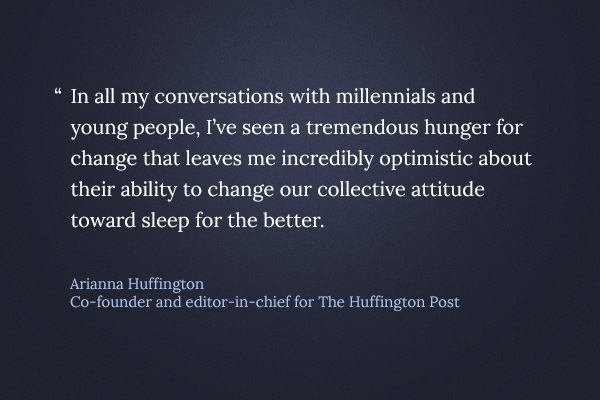
Firas: What small change do you think offers the most benefit, for the average person simply trying to be healthy and find balance?
Arianna: One small change I swear by is this: Don’t charge your phone next to your bed. Even better: gently escort all devices completely out of your bedroom.
Firas: How do you think the world would change if everyone, from students to world leaders, started prioritizing rest and sleep deprivation became a thing of the past?
Arianna: The world would be better in every way, because we’d be taking full advantage of sleep’s miraculous benefits. We’d improve our decision making, emotional intelligence, cognitive function, and creativity. So it’s my hope that everyone will make sleep a priority, and in doing so discover its transformative power just as I have. Now, instead of waking up to the sense that I have to trudge through activities, I wake up feeling joyful about the day’s possibilities. And I’m also better able to recognize red flags and rebound from setbacks. It’s like being dialed into a different channel that has less static.
About the author
Firas is the CEO and co-founder of Amerisleep. He is a sleep evangelist, who truly believes rest is an important part of living well. As CEO, Firas works to promote a creative and inspired environment at Amerisleep, implementing things like our signature Nap Room to keep the team connected with the brand's core mission of wellness. He writes on the Amerisleep about getting better sleep and healthy living, and also contributes to Entrepreneur, Huffington Post, and elsewhere.
View all posts